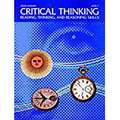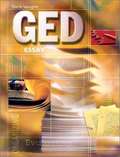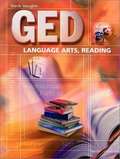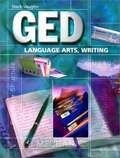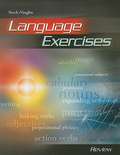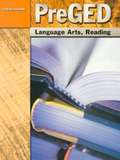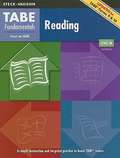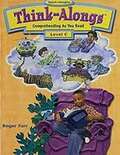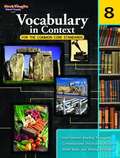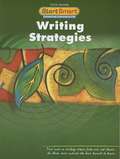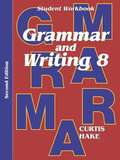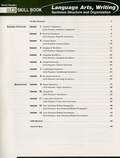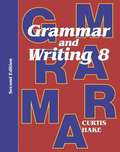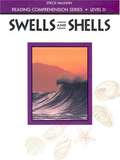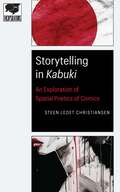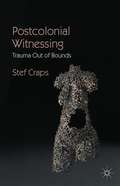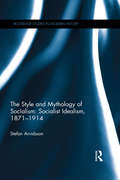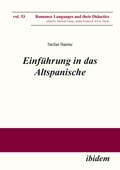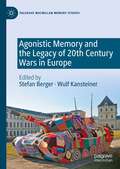- Table View
- List View
Critical Thinking: Reading, Thinking, and Reasoning Skills
by Steck-VaughnTextbook to improve students' reading, thinking, and reasoning skills.
GED: Essay
by Steck-VaughnThe only GED preparation program based on results of the current GED Tests! The new Steck-Vaughn GED is a result of thorough research and analysis based on examining results from the latest GED Tests. It has more practice tests, more exercise pages, and expanded lessons. Each of the six books(one for every GED testing area) teaches the knowledge, skills, and confidence a GED candidate needs for test-day success -- and the results are guaranteed! A simple, self-contained guide to essay writing -- Part II of the GED Writing Skills Test. Steck-Vaughn's unique POWER points (Plan, Organize, Write, Evaluate, Revise) are provided as an effective tool for producing good essays. Sections on "Content" and "Scoring" and suggestions on liming help learners plan test-taking strategies.
GED: Language Arts, Reading
by Steck-VaughnGED: Language Art, Reading will test your ability to apply reading and critical thinking skills to text.
GED: Language Arts, Writing
by Steck-VaughnThe Steck-Vaughn GED Language Arts, Writing book helps you develop the necessary proofreading and editing skills by giving detailed explanation of why the correct answer is right and the incorrect answers are wrong. By studying these explanations, you will learn strategies for understanding and thinking about these topics. To prepare for the essay portion of the test, consider reviewing the Steck-Vaughn GED Essay book.
Language Exercises Review
by Steck-VaughnA review of all of the language exercises in the 8 language exercises books by Steck-Vaughn.
Pre-GED Critical Thinking Skills
by Steck-VaughnThe purpose of this book is to help you practice the critical thinking and graphic skills you will need to answer questions on the GED Language Arts, Reading; Social Studies; and Science Tests.
Pre-GED Language Arts Reading
by Steck-VaughnThis Pre-GED Language Arts Reading contains lessons on reading skills classified under four units: Non-fiction, Fiction, Drama and Poetry.
Steck-Vaughn Fundamental Skills for Writing: Grammar & Mechanics Intermediate Workbook
by Steck-VaughnSteck-Vaughn Fundamental Skills for Writing Grammar & Mechanics Intermediate Workbook
Steck-Vaughn Fundamental Skills for Writing: Vocabulary & Composition Beginning Workbook
by Steck-VaughnSteck-Vaughn Fundamental Skills for Writing: Vocabulary & Composition Beginning Workbook
TABE Fundamentals: Reading, Level M (2nd edition)
by Steck-VaughnTABE stands for the Tests of Adult Basic Education. These paper-and-pencil tests, published by McGraw-Hill, measure your progress on basic skills. There are five tests in all: Reading, Mathematics Computation, Applied Mathematics, Language, and Spelling.
Vocabulary in Context for the Common Core Standards, Grade 8
by Steck-VaughnProvides exercises designed to stimulate vocabulary growth, offers specially designed sections to build skills required for standarized tests, and introduces three hundred new words.
Writing Strategies: Start Smart
by Steck-VaughnThis book is everybody can write, but writing well takes some work. Steck-Vaughn's Start Smart Writing Strategies will give you strategies to help you improve your writing. By writing better, you will communicate better and get the results you want at school, at work, and in life. Writing is an active process. Good writers do more than just put words down on paper. They focus on their purpose and how they can best interest readers. They make sure their writing is clear, logical, and appealing. The strategies in this book will help you do the same. You'll learn to plan, write a solid first draft, and polish your writing through revision and proofreading. Try all of the strategies and see which ones work best for you. Your favorites will help you again and again.
Saxon Grammar & Writing 8: Student Workbook (Second Edition) (Grammar & Writing Ser.)
by Steck-Vaughn Company WorkbookStudent Textbook: Each lesson contains instruction with examples, a set of practice questions, and a review set, which includes previous material, Weekly dictations for practice in spelling and punctuation, Suggested journal topics for student journals. Student Workbook: Writing lessons introduce students to key elements of writing, from combining sentences to constructing essays to writing short stories. Lessons include examples, practice questions, and review questions. Additional practice for grammar lessons: Fun Silly Story activities. Teacher Packet: Answers for all practice sets, review sets, and writing lessons, Schedule (144 school days), Test masters, Test answers.
Steck-Vaughn Reasoning Through Language Arts Test Preparation for the 2014 GED Test
by Steck-Vaughn CompanyThis Student Workbook allows learners who need repetition to take comfort in the similar lesson structure based on the Review-Refine-Master learning sequence. To convey deeper understanding, content in the Review section presents the material with a new approach. Each lesson provides multiple guided-practice items, callouts and testing tips.
Skill Book: Sentence Structure and Organization
by Steck-Vaughn GedProvides practice in sentence structure and organization for GED preparation.
Grammar And Writing 8th (Second Edition, Student Edition)
by Steck-Vaughn StaffWelcome to a language arts program designed for easy reading and instruction. Behind this program is a team of dedicated teachers who care about your success and desire to present incremental teaching material in a simple format.
Swells and Shells: Reading Comprehension Level D
by Steck-Vaughn StaffRead an exciting story while learning more about good reading comprehension.
Storytelling in Kabuki: An Exploration of Spatial Poetics of Comics (Encapsulations: Critical Comics Studies)
by Steen Ledet ChristiansenSteen Ledet Christiansen&’s Storytelling in &“Kabuki&” explores the series created by David Mack—a slow, recursive narrative that focuses on the death of Kabuki and her past. The series ran from 1994 to 2004 in a variety of miniseries, one-shots, and spin-offs, rather than following a conventional American monthly release schedule. Most of the series explores different perspectives on the same event and adds background to Kabuki&’s past, usually through surreal sequences, dreams, and near-death experiences. The flexibility of comics&’ approach to chronology, space, focalization, narrative, and fictionality enabled Mack to produce an unusual experience. Kabuki tells a story that can only exist via comics. Christiansen analyzes the visual design of the series, a heterogeneous collection of styles depending on the story. To understand Kabuki, it is crucial to explore the visual styles, as well as the use of visual and spatial rhymes and mixed media forms. Because Kabuki employs a complex layering of focalizations, diegetic levels, and metafictional self-reflectivity that is rare in mainstream American comics, it utilizes a narrative poetics that focuses on constant repeating, restating, and returning to the same events.Kabuki&’s unique compositional layering allows Christiansen to provide a clear example of how comics work while also expanding on critical vocabulary, especially in terms of spatial poetics. By exploring spatial form, Christiansen illuminates and gives a critical framework to a different and underexamined aspect of comics.
Postcolonial Witnessing
by Stef CrapsDespite a stated commitment to cross-cultural solidarity, trauma theory - an area of cultural investigation that emerged out of the 'ethical turn' affecting the humanities in the 1990s - is marked by a Eurocentric, monocultural bias. Now in paperback and with a Preface by Rosanne Kennedy, this book takes issue with the tendency of the founding texts of the field to marginalize or ignore traumatic experiences of non-Western or minority groups, and to take for granted the universal validity of definitions of trauma and recovery that have developed out of the history of Western modernity. Moreover, it questions the assumption that a modernist aesthetic of fragmentation and aporia is uniquely suited to the task of bearing witness to trauma, and criticizes the neglect of the connections between metropolitan and non-Western or minority traumas. Combining theoretical argument with literary case studies, Postcolonial Witnessing contends that the suffering engendered by colonialism needs to be acknowledged more fully, on its own terms, in its own terms, and in relation to traumatic First World histories if trauma theory is to redeem its promise of cross-cultural ethical engagement.
The Style and Mythology of Socialism: Socialist Idealism, 1871-1914 (Routledge Studies in Modern History)
by Stefan ArvidssonArguably no modern ideology has diffused as fast as Socialism. From the mid-nineteenth century to the last quarter of the twentieth socialist ideals played a crucial part not only in the political sphere, but also influenced the way people worked and played, thought and felt, designed and decorated, hoped and yearned. By proposing general observations on the relationship between socialism, imagination, myth and utopia, as well as bringing the late nineteenth century socialist culture – a culture imbued with Biblical narratives, Christian symbols, classic mythology, rituals from freemasonry, Viking romanticism, and utopian speculations – together under the novel term ‘socialist idealism’, The Style and Mythology of Socialism: Socialist Idealism, 1871–1914 draws attention to the symbolic, artistic and rhetorical ways that socialism originally set the hearts of people on fire.
Einführung in das Altspanische
by Stefan BarmeThis introduction to Medieval Spanish, or Old Spanish, closes a long-standing gap in the literature. Focusing on the internal history of the Spanish language, it traces its phonetic, grammatical, and lexical development from classical and vulgar Latin to Medieval Spanish. The characteristics of the Old Spanish language are also illustrated through a presentation and commentary of suitable text excerpts that represent its different stages of development.
Einführung in das Altspanische (Romance Languages and Their Didactics #53)
by Stefan BarmeThis introduction to Medieval Spanish, or Old Spanish, closes a long-standing gap in the literature. Focusing on the internal history of the Spanish language, it traces its phonetic, grammatical, and lexical development from classical and vulgar Latin to Medieval Spanish. The characteristics of the Old Spanish language are also illustrated through a presentation and commentary of suitable text excerpts that represent its different stages of development.
Agonistic Memory and the Legacy of 20th Century Wars in Europe (Palgrave Macmillan Memory Studies)
by Stefan Berger Wulf KansteinerThis book discusses the merits of the theory of agonistic memory in relation to the memory of war. After explaining the theory in detail it provides two case studies, one on war museums in contemporary Europe and one on mass graves exhumations, which both focus on analyzing to what extent these memory sites produce different regimes of memory. Furthermore, the book provides insights into the making of an agonistic exhibition at the Ruhr Museum in Essen, Germany. It also analyses audience reaction to a theatre play scripted and performed by the Spanish theatre company Micomicion that was supposed to put agonism on stage. There is also an analysis of a Massive Open Online Course (MOOC) designed and delivered on the theory of agonistic memory and its impact on the memory of war. Finally, the book provides a personal review of the history, problems and accomplishments of the theory of agonistic memory by the two editors of the volume.
